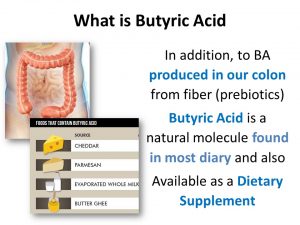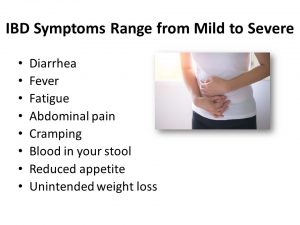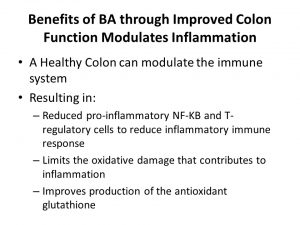Butyric Acid for Better Gut Health
 Butyric acid or BA, may sound like an exotic chemical made in a test tube from a science experiment. But it’s origin is actually much simpler and more natural. Butyric acid is a molecule made in our large intestines (gut) by billions of bacteria that reside there. The bacteria that live in our gut are critical for the proper digestion of food for energy, to produce molecules needed to build new cells and for the production of critical vitamins. These essential gut bacteria also help fight off unhealthy bacteria and viruses that enter our digestive tract.
Butyric acid or BA, may sound like an exotic chemical made in a test tube from a science experiment. But it’s origin is actually much simpler and more natural. Butyric acid is a molecule made in our large intestines (gut) by billions of bacteria that reside there. The bacteria that live in our gut are critical for the proper digestion of food for energy, to produce molecules needed to build new cells and for the production of critical vitamins. These essential gut bacteria also help fight off unhealthy bacteria and viruses that enter our digestive tract.
Certain healthy gut bacteria make BA as a byproduct from the digestion of cellulose, found in plants and starches, a type of sugar. BA is a type of short-chain fatty acid, and is very small in size. With generally only 6 carbon molecules it can easily enter the cells that line the colon. Once inside the colon cells, BA can be used as an additional energy source. And just like every other cell type in our body, greater energy means better function.
 The results of better functioning colons cells can mean:
The results of better functioning colons cells can mean:
- Improved transport of nutrients through the cell walls
- Improved resistance to inflammation and oxidative stress of the intestinal lining
- Reinforcing the intestinal barrier to keep unhealthy molecules and unhealthy bacterial toxins out
- Reduce excessive spasm and hypermobility of the colon
- Inhibit colon carcinoma formation
Other Sources of Butyric Acid
Butyric acid is not only produced by our colon bacteria, but is also found in many dairy products. Butter has a high percentage of butyric acid, but consumed in large amounts, the saturated fats it contains has been linked to increases in cholesterol and vascular problems. More recently, butyric acid is now available as a dietary supplement. Additionally, certain type of fiber sources, called prebiotics, can be consumed both as foods and as dietary supplements, that promote increased native bacterial butyric acid production.
 What are Some of the Human Benefits of Butyric Acid
What are Some of the Human Benefits of Butyric Acid
Numerous studies have researched the potential health benefits of butyric acid for certain abnormal colon conditions. The most common types investigated have been IBS (Irritable Bowel Syndrome) and to a lesser extent, Ulcerative colitis and Crohn’s disease. IBS is a functional bowel disorder that is commonly diagnosed.
Approximately 12% of adults in the general population experience symptoms of IBS. It has been shown that those with IBS consistently have lower levels of BA when tested. In a human study with those suffering from IBS there was a reported decrease in the frequency of abdominal pain after eating and bowel movements after using BA supplementation of 12 weeks. There was also less urges to have a bowel movement. These are the three most common issues with IBS. Butyric acid use for IBS is thought to enhance colon cell function to reduce  inflammation, increase cell repair, modulate water reuptake and normalize mobility of the colon.
inflammation, increase cell repair, modulate water reuptake and normalize mobility of the colon.
There is still much to learn about BA and its intestinal benefits. Recent studies have suggested these benefits can extend beyond the colon and may benefit the body and brain. Several studies, mostly in animal models, have show BA benefits for certain abnormal blood conditions, genetic metabolic diseases, hypercholesterolemia, insulin resistance, and even ischemic stroke.
At this time, dosing and frequency for BA as a dietary supplement has not been established. Like all new supplements or dietary changes speak to your healthcare provider before starting anything new.
References:
- https://www.ncbi.nlm.nih.gov/pmc/articles/PMC3070119/
- https://www.ncbi.nlm.nih.gov/pmc/articles/PMC4027835/
- https://smw.ch/article/doi/smw.2012.13596




 Dr. Maroon received an athletic scholarship to Indiana University in Bloomington, Indiana where as an undergraduate, he was named a Scholastic All-American in football. Dr. Maroon has successfully maintained his personal athletic interests through participation in 9 marathons and more than 72 Olympic-distance triathlon events. However, his greatest athletic accomplishment is his participation in 8 Ironman triathlons (Hawaii – 1993, 2003, 2008, 2010, 2013; Canada – 1995; New Zealand – 1997; Germany – 2000), where he usually finishes in the top 10 of his age group. Recently, in July 2012 and 2013, he finished second and third, respectively, in his age group in the Muncie, Indiana half Ironman triathlon. In October 2013 he completed his 5th World Championship Ironman in Kona, Hawaii.
Dr. Maroon received an athletic scholarship to Indiana University in Bloomington, Indiana where as an undergraduate, he was named a Scholastic All-American in football. Dr. Maroon has successfully maintained his personal athletic interests through participation in 9 marathons and more than 72 Olympic-distance triathlon events. However, his greatest athletic accomplishment is his participation in 8 Ironman triathlons (Hawaii – 1993, 2003, 2008, 2010, 2013; Canada – 1995; New Zealand – 1997; Germany – 2000), where he usually finishes in the top 10 of his age group. Recently, in July 2012 and 2013, he finished second and third, respectively, in his age group in the Muncie, Indiana half Ironman triathlon. In October 2013 he completed his 5th World Championship Ironman in Kona, Hawaii.